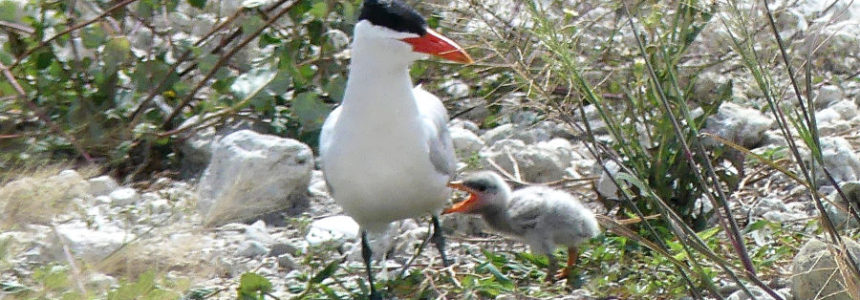News & Updates
Port Tampa Bay helps protect thousands of migratory birds during nesting season

Port Tampa Bay, along with Audubon Florida, encourages recreational boaters to be respectful and aware of wildlife during the 2021 nesting season for migratory birds. Globally significant populations of migratory birds nest on the port’s two dredge material management areas and spoil islands in Hillsborough Bay throughout the summer. Both dredge islands are under the oversight of the Migratory Bird Protection Interagency Committee. The official nesting season runs from April 1 through August 31 and represents a cooperative effort between Port Tampa Bay, Audubon Florida, the U.S. Army Corps of Engineers, Florida Fish and Wildlife Conservation Commission, and other local, state, and federal agencies.
The islands provide a protected nesting habitat for rare species, including American Oystercatchers andLeast Terns,to complete their reproductive cycle. Each year, the islands become one of the bay area’s prime nesting sites, hosting thousands of nesting birds. In 2020, one of the port’s two dredge material management areas and spoil islands had the greatest diversity of nesting shorebird species than any other spot in the state. The spoil island, called 3D, hosted more than 4,100 pairs of nesting birds made up of several species of tern (including the Least Tern), American Oystercatchers, Black Skimmers, and others. The port’s spoil island just to the north, 2D, saw 10 pairs of American Oystercatchers nest along its shoreline and fledge four chicks.
“Port Tampa Bay takes our role as an environmental leader seriously and remains deeply committed to the protection of the thousands of migratory nesting birds who make our spoil islands their home each summer. We encourage everyone to do their part to uphold the health and vitality of the waters around Tampa Bay and the species that thrive there,” explained Paul Anderson, Port Tampa Bay President and CEO.
“We have seen a huge increase in the number of recreational boaters using the bay. It is more important than ever that we help ensure the success of birds using the island to raise chicks. The public should enjoy the many species that call our area but home but be sure to give them plenty of space for them to go about their business of raising their family,” said Mark Rachal, the Sanctuary Manager with Audubon Florida.
